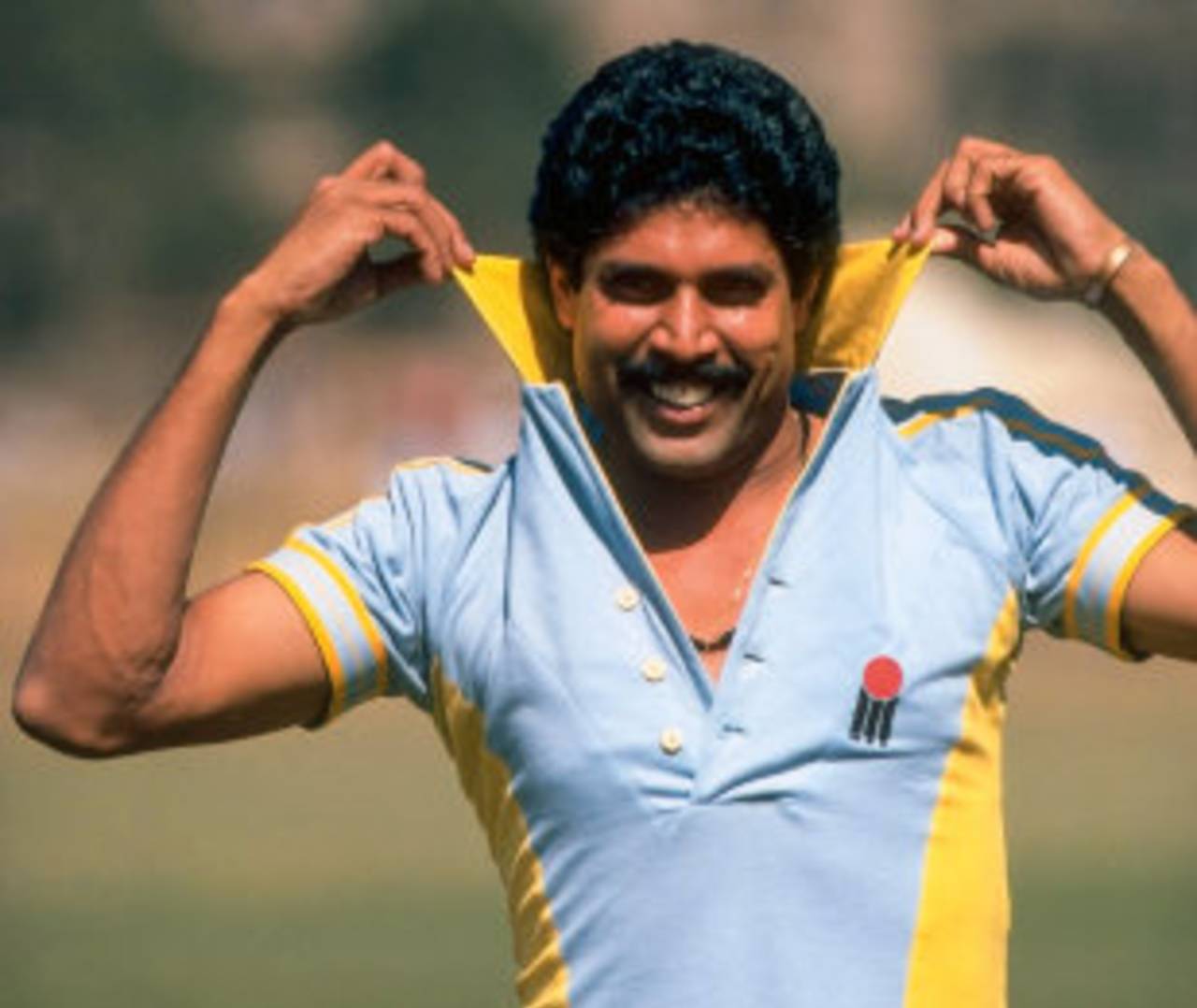Ronchi's rare double, and agreeing on a result
Also: most wickets without a ten-for, the biblical remark made to Plum Warner, youngest to 300 Test wickets, and a record of zero Tests in the family

Kapil Dev: youngest to 300 Test wickets • Getty Images
This particular double is unique: no one had played for both Australia and New Zealand in official internationals before Luke Ronchi, who was born in Dannevirke (New Zealand) but moved to Australia when he was seven. He played four one-day internationals in the West Indies in 2008, taking a catch off Brett Lee from the first ball he kept to, and also appeared in three Twenty20 games for them. Stiff competition meant he fell back in the Australian pecking order, and eventually he returned to his native country, and has done well for Wellington since. Ronchi made his ODI debut for New Zealand at Lord's last week, but had to wait till the 11th over to get on to the scorecard this time, when he caught Ian Bell. Ronchi is the seventh player to appear for two different countries in official one-day internationals, following Dougie Brown (England and Scotland), Anderson Cummins (West Indies and Canada), Ed Joyce and Eoin Morgan (England and Ireland), Clayton Lambert (West Indies and USA) and Kepler Wessels (Australia and South Africa).
The difference is that the first Test was limited to five days, but the fourth (final) Test in Kingston was supposed to be a timeless one, played out to a finish regardless of how long it took, to decide a series which was tied at 1-1 going in to the match. It was a high-scoring game - Andrew Sandham made the first triple-century in a Test as England piled up 849 - but then bad weather took a hand. No play was possible on the eighth and ninth scheduled days, after which the England team needed to leave to catch the boat home - so the match was left drawn after all. England's captain, Freddie Calthorpe, might have regretted not enforcing the follow-on despite a first-innings lead of 563!
There are two bowlers above Jacques Kallis - who currently has 288 Test wickets - who never managed a ten-wicket haul either: Bob Willis took 325 wickets for England, and Brett Lee 310 for Australia. Kallis - whose best match figures to date are 9 for 92 - has taken five or more in an innings only five times. None of the bowlers above him in the wickets list has taken fewer than ten (which is the number taken by Lee, who never actually took more than five wickets in any innings, and Zaheer Khan).
The Test player in receipt of this biblical remark was the former England skipper Pelham "Plum" Warner, who found himself running out of puff while batting in a match in Egypt shortly after the First World War ended. According to his autobiography Long Innings, Warner, who was 45 by then, remarked to the "admirable Sergeant-Major who was umpiring" that he was thinking of giving up first-class cricket as he was getting too old. The military man apparently replied: "Give it up, sir! Give it up, sir! Never heard of such a thing, sir! Don't be a fool, sir, if I may say so, sir. I have not seen as straight a bat as yours, sir, between Dan and Beersheba!"
The South African fast bowler Vernon Philander lies seventh on the list of wicket-takers after 16 Tests, level with the 19th-century Australian "Demon" Fred Spofforth. Above him lie R Ashwin and Clarrie Grimmett (92 wickets after 16 Tests), Alf Valentine (93), Sydney Barnes and Charles "Terror" Turner (94), and George Lohmann (101). Philander and Ashwin have their work cut out to move up the list in the near future: Lohmann had 109 wickets after 17 Tests, and ended his career with 112 after 18. Barnes also had 112 after 18 (and 19), but assumed the lead with 122 wickets after 20 Tests.
Jimmy Anderson became the 26th bowler to reach 300 Test wickets when he had Peter Fulton caught at slip by his great mate Graeme Swann in the first innings at Lord's last month. Anderson is actually in a respectable mid-table position age-wise - he's the 13th-youngest (or 14th-oldest) of the 26, being five days younger than Glenn McGrath was when he reached the mark in 2000-01. The youngest man to reach 300 Test wickets is Kapil Dev, who got there the day after his 28th birthday in January 1987. Shane Warne, Harbhajan Singh, Muttiah Muralitharan and Ian Botham (the only Englishman younger than Anderson, at 28 years 259 days), were also 28 when they reached 300. The oldest man to make it to 300 was Lance Gibbs, who was 41 in 1975-76.
"You mention that Hemant Kanitkar and his son Hrishikesh played the same number of Test matches [two]. My father and I have a similar record. Both of us played zero Test matches. Incidentally that is the same number of Test matches my brother has played. Surely that is some sort of record?" Nice try - but I suspect there are rather a lot of families like that (mine, for a start!)
Steven Lynch is the editor of the Wisden Guide to International Cricket 2013. Ask Steven is now on Facebook